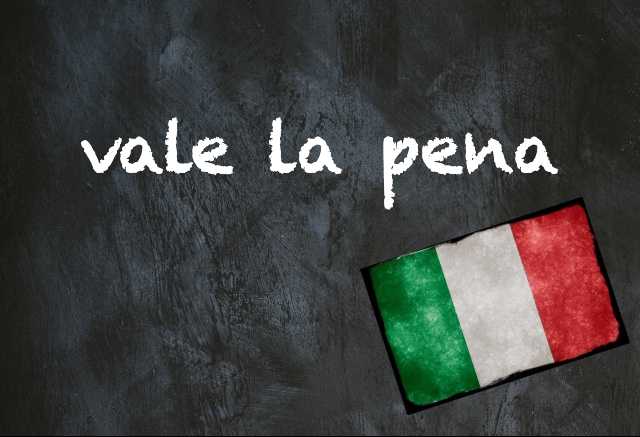Italian expression of the day: 'Vale la pena'

It's well worth making the effort to learn this simple phrase.
A pena by itself in Italian isn't exactly a good thing: it generally means a penalty, sentence, or some form of punishment, pain, or grief.
Se la polizia ti prende rischi una lunga pena detentiva.
You risk a lengthy prison sentence if the police catch you.
Sentivo la sua pena.
I felt her grief.
But when used in the expression vale la pena, the word takes on a positive connotation: it means something's worth the trouble, or effort.
If you want to talk about something in particular being worth the effort, you need to follow the phrase up with the infinitive of a verb (unlike in English, where we often use the -ing form, or gerund).
Vale la pena leggere Dante.
Reading Dante is worth the effort.
According to the Treccani dictionary, it's more correct to use the preposition di directly after the phrase and before the infinitive than it is to use nothing at all - though Treccani does acknowledge that "the form without the preposition also has a certain diffusion in its use".
Treccani offers this line from the poet Leopardi's published letters as an example of the correct formulation:
"Ma queste offerte son cose di tanto poco momento, che non vale la pena di parlarne"
"But these offers are things of so little moment, it's not worth talking about them":
In reality, though, you're much more likely to hear the version that dispenses with di used in modern spoken Italian.
Vale la pena visitare la Cappella Sistina e la Basilica di San Pietro.
It's worth visiting the Sistine Chapel and St. Peter's Basilica.
Vale la pena spendere un po' di più per mangiare bene.
It's worth spending a bit more to eat well.

What if you want to use vale la pena at the end of a sentence, to say that something you've already discussed is worth the effort?
In this case we use the preposition ne (which can mean a range of things but here means 'it'), directly before the phrase, to say 'it's worth the effort'.
Quella torta richiede quattro ore di preparazione, ma credimi, ne vale la pena.
That cake takes four hours to prepare, but believe me, it's worth the effort.
Ditemi che ne valeva la pena.
Tell me it was worth it.
We hope you agree this is one little phrase it's worth adding to your repertoire.
Do you have an Italian word you’d like us to feature? If so, please email us with your suggestion.
Comments
See Also
A pena by itself in Italian isn't exactly a good thing: it generally means a penalty, sentence, or some form of punishment, pain, or grief.
Se la polizia ti prende rischi una lunga pena detentiva.
You risk a lengthy prison sentence if the police catch you.
Sentivo la sua pena.
I felt her grief.
But when used in the expression vale la pena, the word takes on a positive connotation: it means something's worth the trouble, or effort.
If you want to talk about something in particular being worth the effort, you need to follow the phrase up with the infinitive of a verb (unlike in English, where we often use the -ing form, or gerund).
Vale la pena leggere Dante.
Reading Dante is worth the effort.
According to the Treccani dictionary, it's more correct to use the preposition di directly after the phrase and before the infinitive than it is to use nothing at all - though Treccani does acknowledge that "the form without the preposition also has a certain diffusion in its use".
Treccani offers this line from the poet Leopardi's published letters as an example of the correct formulation:
"Ma queste offerte son cose di tanto poco momento, che non vale la pena di parlarne"
"But these offers are things of so little moment, it's not worth talking about them":
In reality, though, you're much more likely to hear the version that dispenses with di used in modern spoken Italian.
Vale la pena visitare la Cappella Sistina e la Basilica di San Pietro.
It's worth visiting the Sistine Chapel and St. Peter's Basilica.
Vale la pena spendere un po' di più per mangiare bene.
It's worth spending a bit more to eat well.

What if you want to use vale la pena at the end of a sentence, to say that something you've already discussed is worth the effort?
In this case we use the preposition ne (which can mean a range of things but here means 'it'), directly before the phrase, to say 'it's worth the effort'.
Quella torta richiede quattro ore di preparazione, ma credimi, ne vale la pena.
That cake takes four hours to prepare, but believe me, it's worth the effort.
Ditemi che ne valeva la pena.
Tell me it was worth it.
We hope you agree this is one little phrase it's worth adding to your repertoire.
Do you have an Italian word you’d like us to feature? If so, please email us with your suggestion.

Join the conversation in our comments section below. Share your own views and experience and if you have a question or suggestion for our journalists then email us at [email protected].
Please keep comments civil, constructive and on topic – and make sure to read our terms of use before getting involved.
Please log in here to leave a comment.